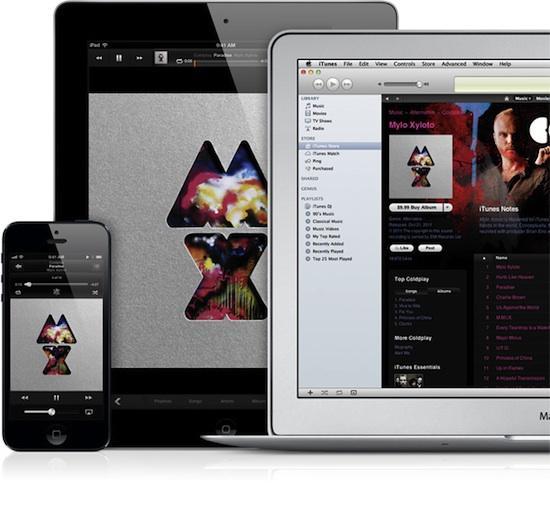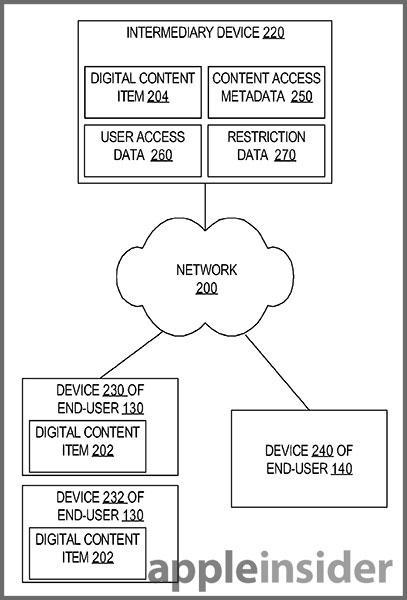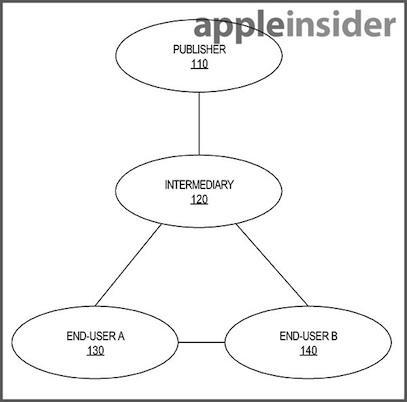
We can buy apps, books, movies and music through the online marketplaces of each mobile operating system, but we might soon be able to sell what we own, too. That is, if you're bound to Apple's ecosystem.
According to AppleInsider, Apple recently filed an exhaustive patent outlining a system that allows owners of digital content to loan and sell "used" content to new end users. The patent is broken into three divisional applications titled "Managing access to digital content items" and date back to 2011. Essentially, the idea of selling your digital content is a flea market, and anyone who "owns" the rights to the digital content can do it. Sales would be device-to-device with Apple's App Store as the mediator, device-to-device with outside verification, or no device-to-device transfer at all.
With this invention comes along the idea that Apple's App Store could be eliminated and the users would be building Apple's customer base for them. Empowering Apple iDevices to buy and sell the digital rights of content would mean less involvement and the possibility of eliminating Apple's App Store entirely.
Here's an excerpt from the latest patent filed by Apple:
"Alternatively, instead of a third party determining whether one or more criteria are satisfied, the first (or second) user's device makes the determination and may be responsible for preventing the first user's device from further consuming the digital content item. In some embodiments, the online store and/or the publisher of the digital content item may receive a portion of the proceeds of the transfer."
While Apple's ecosystem could essentially be put on the back burner, the publisher of the digital content is still the true owner and operator of the content. Thus, certain restrictions of the transferring of digital content is necessary to manage the flow of content between users. These restrictions could be implemented by time, frequency, price of content, or the purchaser (end user). The patent even goes into depth of how royalties would work between publisher of the digital content, the App Store, and the end user, with the publisher always retaining a portion of the proceed and rights of the digital content.
The image below puts the invention into a diagram that shows how the rights of digital content can be loaned, or sold. The bottom left-side shows how content bought and tied to a certain Apple device could be transferred to an entirely different person (a sale), while the second shows an end user switch (a loan).

Both possibilities prove that putting this into practice would increase user dependence on Apple's ecosystem. With this concept, Apple is targeting multiple business platforms. The first is their own, which would essentially "delete" the consumer reliance upon an App Store for new digital content purchases. The second platform is the flea market concept which would provide a platform for users to profit from the sale of their own digital content to new end users.
Could this also target the traditional dot-com platforms where we buy, sell, and trade intangible items?
The answer to that question is "yes" as proven by an identical patent filed by Amazon back in 2009. Though Amazon's ecosystem is primarily for tangible goods, and although their digital content selection is growing, Amazon is still working to create customer dependence on their ecosystem with their Kindle devices.
While the idea of a distributed marketplace where users run and operate the business of digital rights management sounds enticing, it won't go over well for those who oppose DRM. DRM's alter-ego "Digital Restrictions Management" simply means technology used to purchase and own digital content is limited by the devices you own. Much to the dismay of Apple's closed ecosystem, you would also be further bound to the company if you decided to buy and sell content for Apple. You now have even more reasons to buy Apple products.
Could you be talked into buying Apple's products to do business?

It is an interesting invention, and makes me wonder just how far Apple is willing to go to increase consumer dependence on their platform. When I first heard about this patent, I was immediately consumed by how business-savvy Apple really is. Though I had not done too much research on DRM before reading up on this patent, the idea of a consumer-centered digital marketplace with little involvement of new purchases is ground-breaking.
What would you do if you could sell your entire library of apps, books, movies, and music?
It's clear that Apple is betting on a consumer-driven marketplace as the future of their App Store. And while the younger platforms of Android, BlackBerry, and Windows Phone struggle for acceptance and "buy-in," Apple is onto the next evolution of the entire ecosystem idea.
What Apple would accomplish by empowering users to "open up shop" with their own digital content is truly revolutionary if you're bound to their ecosystem. Though I'm largely against the closed mentality of a company that won't even let you use their devices as USB Mass Storage, and actively forces users to manage files through their iTunes "medium," I think Apple is onto something that could revolutionize online business.
This is assuming everyone plays nice and there are no lawsuits and patent disputes.
Does the idea of making some extra cash on the digital content you already own entice you? Would the idea of loaning or selling digital content you already own convince you to purchase an Apple product?